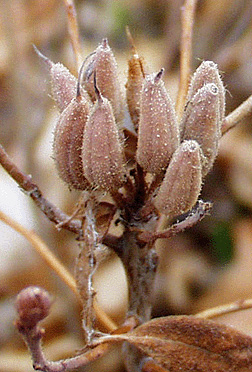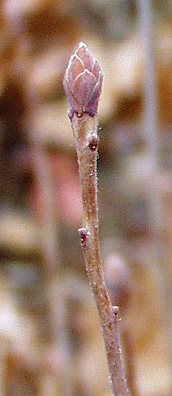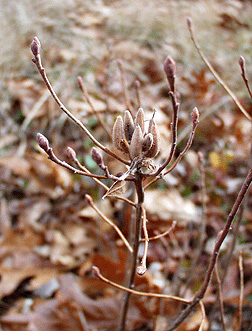 Virginia Tech Dendrology
Virginia Tech Dendrology
rhodora Ericaceae Rhododendron
canadense (L.) Torr.
![]()
![]() symbol: RHCA6
symbol: RHCA6
Leaf: Alternate (tightly clustered at twig tips appearing whorled), simple, deciduous, ovate, 1 to 2 1/2 inches long, pinnately veined, blue-green or gray-green above and green below with a ciliate margin.
Flower: Species is monoecious; very showy, light pink to violet, in clusters of 2 to 6, each flower 1 inch across, with 5 stamens; appearing before the leaves in mid-spring.
Fruit: An oblong orange-brown capsule, 1/4 to 1/2 inch long, with ascending hairs. The capsule splits when ripe, releasing the very tiny, somewhat winged seeds in late summer.
Twig: Very slender, red-brown to gray, bristly-hairy; buds are multiple terminal, pointed and yellow-green to red-brown, flower buds are much larger 1/2 inch long, broadly ovate.
Bark: Gray to redddish-brown, becoming finely shreddy.
Form: A stoloniferous shrub that branches low, often with a crooked stem, may reach up to 4 feet tall but usually smaller. The multiple terminal buds often result in whorls of twigs from the central stem.
Looks like: pink azalea
Additional Range Information: Rhododendron canadense is native to North America. Range may be expanded by planting. Download the full-size PDF map.
External Links: USDA Plants Database
All material 2021 Virginia Tech Dept. of Forest Resources and Environmental Conservation; Photos and text by: John Seiler, Edward Jensen, Alex Niemiera, and John Peterson; Silvics reprinted from Ag Handbook 654; range map source information





